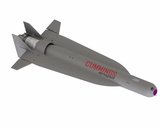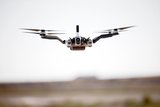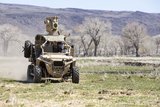Protonex announces new UAV fuel cell power system
Protonex has announced that its UAV-H500 fuel cell power system for unmanned aerial and ground vehicles is now commercially available, bringing more cost-effective alternatives to the market. The company made the announcement 2 August 2012.
The UAV-H500 is a commercial variant of the power system used by the US Naval Research Laboratory to set a flight endurance record on its small Ion Tiger UAV. The Ion Tiger completed a 26 hour flight powered by the Protonex power system, setting an endurance record for fuel cell powered flight.
According to the company, electric propulsion for small UAV provides low cost of ownership and very quiet operation. While the energy density available from even advanced battery solutions limits flight durations and increases operational costs, the 26+ hour duration of the Ion Tiger flight represents a seven-fold improvement in endurance over available advanced batteries. The system employs a high performance, ultra-light proton exchange membrane (PEM) fuel cell system, coupling advanced balance of plant components with stack technology that can achieve a power density of 1,000 watts per kilogram.
The UAV-H500 brings this capability to the commercial UAV market. Prior to the UAV-H500, extended endurance was only achievable with larger, more costly UAVs platforms. The company said ‘the UAV-H500 is an extremely simple and robust system, providing the operator with longer maintenance intervals and lower operational costs than comparable combustion engines. Critical missions can now be achieved using smaller, more cost-effective UAV platforms that incorporate the Protonex advanced power system.’
More from Uncrewed Vehicles
-
![Cummings Aerospace showcases Hellhound loitering munition designed for US Army’s LASSO programme (video)]()
Cummings Aerospace showcases Hellhound loitering munition designed for US Army’s LASSO programme (video)
Cummings Aerospace presented its turbojet-powered Hellhound loitering munition at SOF Week 2025, offering a man-portable solution aligned with the US Army’s LASSO requirements.
-
![SOF Week 2025: PDW unveils attritable FPV drone for SOF operations at scale]()
SOF Week 2025: PDW unveils attritable FPV drone for SOF operations at scale
PDW has revealed its Attritable Multirotor First Person View drone at SOF Week 2025, offering special operations forces a low-cost, rapidly deployable platform for strike and ISR missions, inspired by battlefield lessons from Ukraine.
-
![SOF Week 2025: Teledyne FLIR white paper provides guidance on reusable loitering munitions]()
SOF Week 2025: Teledyne FLIR white paper provides guidance on reusable loitering munitions
Teledyne FLIR is highlighting the emerging requirements for 'recoverable and re-usable' loitering munitions across the contemporary operating environment during this week’s SOF Week conference in Tampa, Florida.
-
![SOF Week 2025: Kraken Technology group debuts K3 Scout USV in North America]()
SOF Week 2025: Kraken Technology group debuts K3 Scout USV in North America
High-performance maritime industry player Kraken Technology Group, based in the UK, has used the SOF Week conference in Tampa, Florida this week to debut its K3 Scout uncrewed surface vessel (USV) to the North American market.
-
![Palladyne AI and Red Cat to demonstrate capabilities for autonomous drone swarms to the US military]()
Palladyne AI and Red Cat to demonstrate capabilities for autonomous drone swarms to the US military
Red Cat and Palladyne AI recently conducted a cross-platform collaborative flight involving three diverse heterogeneous drones.
-
Jammer resistant drone designs spark search for countermeasures
The Russia-Ukraine conflict has driven another stage of evolution for drones and the counter measures to defend against them.

























